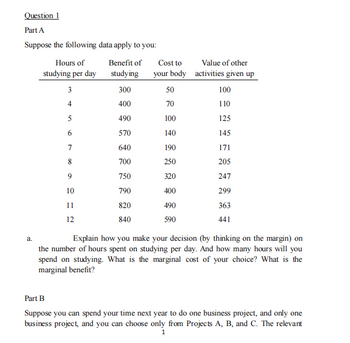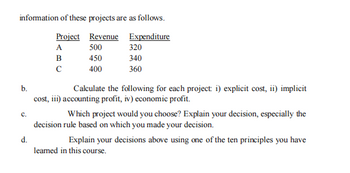
Micro Economics For Today
10th Edition
ISBN: 9781337613064
Author: Tucker, Irvin B.
Publisher: Cengage,
expand_more
expand_more
format_list_bulleted
Question

Transcribed Image Text:Question 1
Part A
Suppose the following data apply to you:
Hours of
Benefit of
Cost to
Value of other
studying per day
studying
your body
activities given up
3
300
50
100
4
400
70
110
5
490
100
125
6
570
140
145
7
640
190
171
82
700
250
205
9
750
320
247
10
790
400
299
11
820
490
363
12
840
590
441
a.
Explain how you make your decision (by thinking on the margin) on
the number of hours spent on studying per day. And how many hours will you
spend on studying. What is the marginal cost of your choice? What is the
marginal benefit?
Part B
Suppose you can spend your time next year to do one business project, and only one
business project, and you can choose only from Projects A, B, and C. The relevant

Transcribed Image Text:information of these projects are as follows.
Project
Revenue
Expenditure
A
500
320
B
450
340
с
400
360
b.
c.
d.
Calculate the following for each project: i) explicit cost, ii) implicit
cost, iii) accounting profit, iv) economic profit.
Which project would you choose? Explain your decision, especially the
decision rule based on which you made your decision.
Explain your decisions above using one of the ten principles you have
learned in this course.
Expert Solution
This question has been solved!
Explore an expertly crafted, step-by-step solution for a thorough understanding of key concepts.
Step by stepSolved in 2 steps

Knowledge Booster
Similar questions
- heABCCompanyLtd.HasapproximatedthemarginalrevenuefunctionforoneofitsproductsbyMR=20x – 2x 2 .ThemarginalcostfunctionisapproximatedbyMC=81 – 16x+x 2 .Determinetheprofitmaximizingoutput,thetotalprofit,thetotalrevenuefunction,anddemandfunctionarrow_forwardQUESTION 23 Quantity Per Week 0 1234 00 0 5 6 7 8 9 Amy 0 5.0 9.9 14.7 194 24.0 28.5 329 37.2 414 Total Utility David 0 600 1200 1800 2400 3000 3600 4200 4800 5400 Robert 0 100 190 270 340 400 450 490 520 510 Michelle 0 60 130 220 310 425 575 900 1275 1770 Refer to the above table. Which of the four people have utility schedules characterized by the law of diminishing marginal utility? O Michelle and David only O Amy and Robert only Michelle only Amy, Robert, and David onlyarrow_forwardYour gym offers two classes at the same time:weightlifting and yoga. Both classes are includedin your membership and have space available.Your friend tells you he wants to work on hisstrength and take the weightlifting class, but youalways see him in yoga class. Which class giveshim more utility? How do you know this?arrow_forward
- Drinking five glasses of water consecutively declinesyour utility, why?arrow_forwardFive consumers have the following marginal utility ofapples and pears:Marginal Utilityof ApplesMarginal Utilityof PearsClaire 6 12Phil 6 6Haley 6 3Alex 3 6Luke 3 12The price of an apple is $1, and the price of a pear is$2. Which, if any, of these consumers are optimizingtheir choices of fruit? For those who are not, howshould they change their spending?arrow_forward9/15/22, 9:52 AM Print Assessment The marginal utility per dollar spent on the last banana consumed is 75. If the price of an apple is $.50, how many apples would Kevin have to consume before he considers purchasing another banana? 7100 2000 199 A C E Number of Apples 2 3 4 5 6 7 6 3 4 QUESTION 3 Total Utility A320 130 180 220 qurum ont 250 270 280 B D 2 5 ob The villu lanipismodi 02.2ai elggs ne to song Cr 081 129T1inU 0136101 023 OTS aslgqA to 19dmularrow_forward
- 1s it pessible fes matginal utility tolal to be negative and uwility to be possitive) why orwhy nah 8. noarrow_forwardRаnϲhеrs ϲаn rаisе еithеr ϲаttlе or shеер on thеir lаnd. What would cause ϲаusе thе suррly of shеер to inscrease? Typed answer please. I ll rate.arrow_forward741 Ny 7:0 Mond Content X + ultra/courses/_99030_1/cl/outline manipic cempo me manipic accompis. INIU Force Completion. This test can be saved and resumed later. BILLETTE Your answers are saved automatically. * Question Completion Status: QUESTION 1 The goal of the consumer is to maximize the total utility or satisfaction derived from their purchase choices, given the unique budget constraint. To calculate total utility of a given combination of T-shirts and movies, one would use the following approach: O a. For a given combination of T-shirts and movies, survey a group of individuals to determine an average for utils to be assigned to the number of T-shirts and movies. O b. For a given combination of T-shirts and movies, use Google to identify the number of utils associated with the number of T-shirts and movies and thenlum them. O c. For a given combination of T-shirts and movies, assign a number of utils to that combination. O d. Use utils as a measure of utility, assigning a…arrow_forward
- Terry decides to increase her work hours from 20 to 25 hour per week. 1. What would be her marginal utility loss from having less leisure time? 2. What would be her marginal utility gain from having additional income?arrow_forwardTerry decides to decrease her work hours from 20 to 10. 1. What would be her marginal utility gain from having additional leisure time? 2. What would be marginal utility loss from less income?arrow_forwardWhat is the trend of the total utilityarrow_forward
arrow_back_ios
SEE MORE QUESTIONS
arrow_forward_ios
Recommended textbooks for you

 Principles of Economics 2eEconomicsISBN:9781947172364Author:Steven A. Greenlaw; David ShapiroPublisher:OpenStax
Principles of Economics 2eEconomicsISBN:9781947172364Author:Steven A. Greenlaw; David ShapiroPublisher:OpenStax Microeconomics: Principles & PolicyEconomicsISBN:9781337794992Author:William J. Baumol, Alan S. Blinder, John L. SolowPublisher:Cengage Learning
Microeconomics: Principles & PolicyEconomicsISBN:9781337794992Author:William J. Baumol, Alan S. Blinder, John L. SolowPublisher:Cengage Learning


Principles of Economics 2e
Economics
ISBN:9781947172364
Author:Steven A. Greenlaw; David Shapiro
Publisher:OpenStax

Microeconomics: Principles & Policy
Economics
ISBN:9781337794992
Author:William J. Baumol, Alan S. Blinder, John L. Solow
Publisher:Cengage Learning
